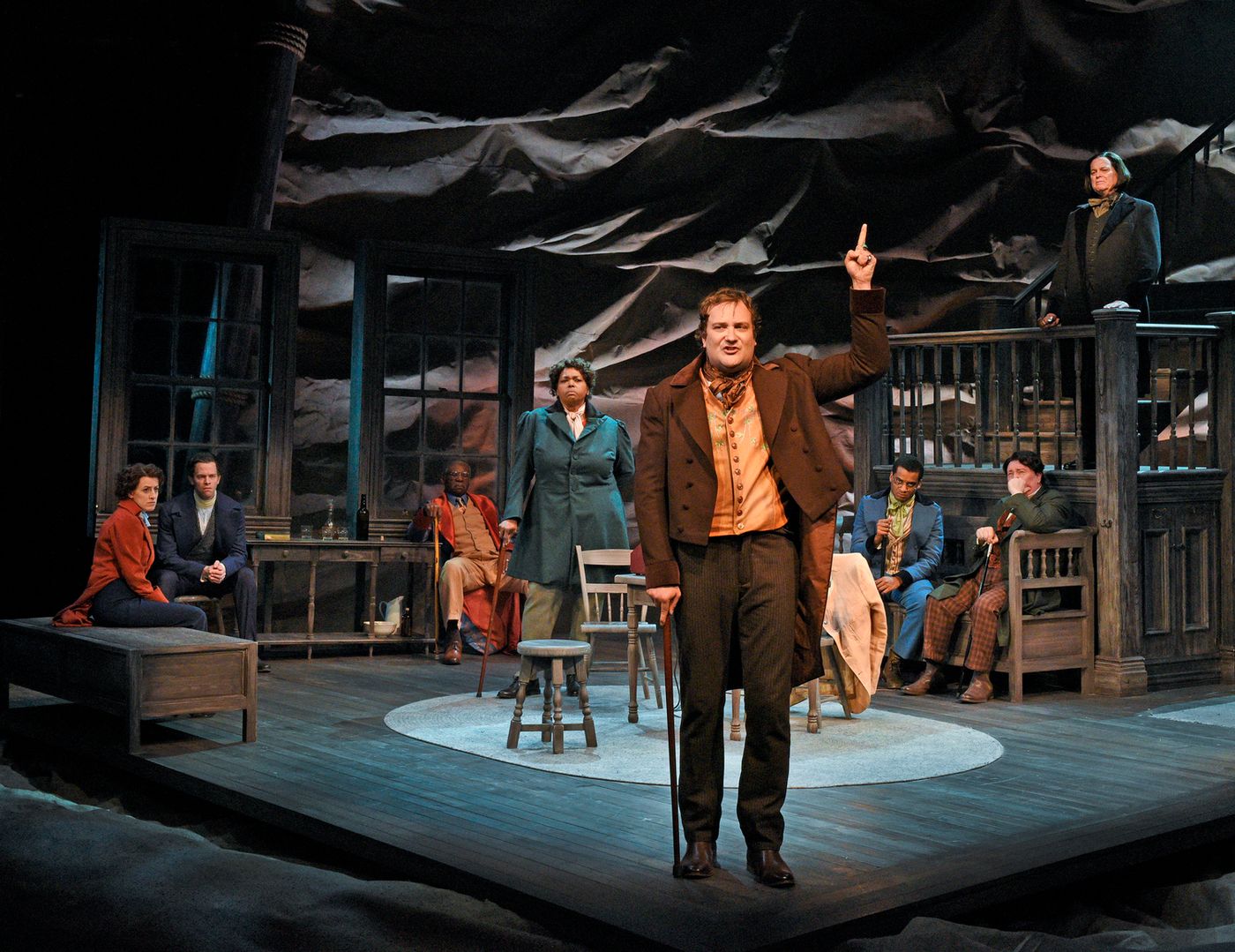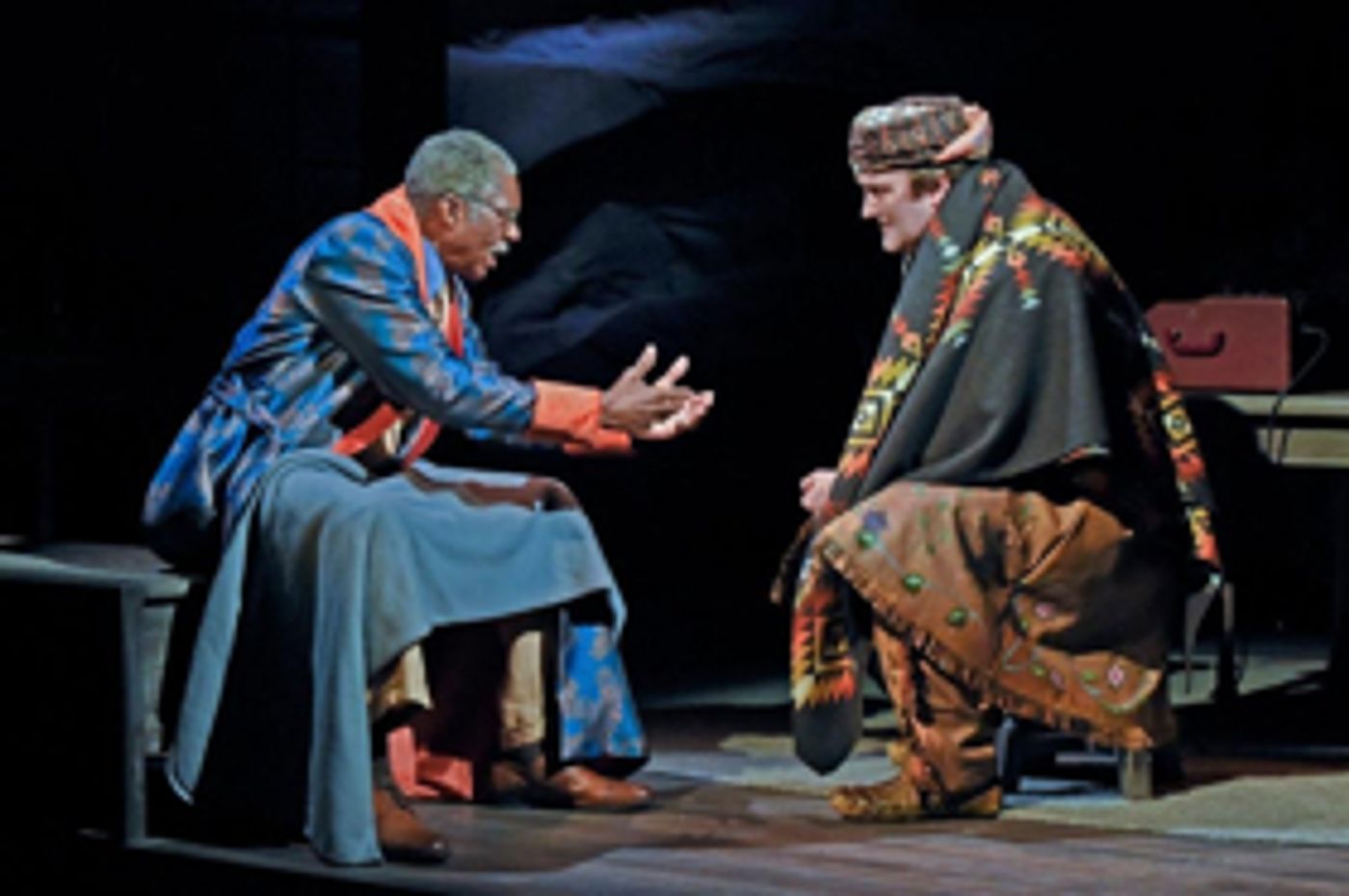Review: THE TRIALS OF SAM HOUSTON at Dallas Theater Center

There are few periods as complicated in American History as the mid-19th century. With the escalation of multiple wars, a still uncertain national boundary, and of course the burgeoning divide between the North and South, the Union and the Confederacy, the narrative of the time is all but clear. Aaron Loeb's new play The Trials of Sam Houston directed by Kevin Moriarty seeks to rediscover the narrative of one of this period's most notorious figures, and while the play does provide a fresh lens for remembering it can't quite decide if this is one of critique or one of praise.
I'm not from Texas, so I did not have that legendary public school Texas History experience - as such, I don't have the same wonder much of the audience has for the eponymous figure, and for the same reason I had to do a fair bit of reading on the life and times of Mr. Houston, here portrayed by Steven Michael Walters. Loeb chooses to focus on a particular slice of Houston's life between his time as Governor of Tennessee and before he heads to Texas, all told through a multi-layered recounting of Houston's former slave, Jeff Hamilton (played in flashback by Ace Anderson, and in a frame narrative by Charlie Robinson). The play begins with Kate Wetherhead's historian character interviewing Jeff (Robinson) as the Great Recession wanes. His story begins to unfold around them in the home, with his daughter (Liz Mikel), himself, and all the other characters donning coats, robes, and hats to portray new characters across the years. At times, Jeff himself adopts an elaborate robe to play Houston in his later years, providing what are easily the most dramatically interesting portions of the evening. The story being told really is Jeff's, exploring his relationship to a man he though he knew by recounting aloud in full for the first time. This is where the strength lies, and I wish that the relationship got a bit more focus - one powerful scene towards the very end will show you why I say this.
 Zooming in and out of each story layer, in a way not unlike Inception, the audience is asked to question and consider the merits of Sam Houston the man. Jeff's daughter Lina (Mikel) makes sure to point out that Houston was a slave-owner, a fact which though pointed and certainly part of the narrative, is almost looked-passed by the gaze of the play. We are asked to understand that Houston was not perfect and de-facto cruel, and yet the second act craves sympathy for a man whose wife left him, and who is fighting for the rights of Native populations. Still, nowhere does the text approach the violence in Texas, the secession of Texas, or the Trail of Tears when confronted with the character of Andrew Jackson. The question and paradox that the audience is confronted with is the conflicting good and bad of a mad whom so much in this state is rooted from. At first, this is a thoughtful commentary and a novel question, but by looking around myself in the audience to see the nods of Texan heads, I'm afraid it missed the mark. The evening left me with the scent of historical revisionism, the kind that wants to glare at an issue and tell you that it is more complicated than you though, all the while hiding the even more damning issues.
Zooming in and out of each story layer, in a way not unlike Inception, the audience is asked to question and consider the merits of Sam Houston the man. Jeff's daughter Lina (Mikel) makes sure to point out that Houston was a slave-owner, a fact which though pointed and certainly part of the narrative, is almost looked-passed by the gaze of the play. We are asked to understand that Houston was not perfect and de-facto cruel, and yet the second act craves sympathy for a man whose wife left him, and who is fighting for the rights of Native populations. Still, nowhere does the text approach the violence in Texas, the secession of Texas, or the Trail of Tears when confronted with the character of Andrew Jackson. The question and paradox that the audience is confronted with is the conflicting good and bad of a mad whom so much in this state is rooted from. At first, this is a thoughtful commentary and a novel question, but by looking around myself in the audience to see the nods of Texan heads, I'm afraid it missed the mark. The evening left me with the scent of historical revisionism, the kind that wants to glare at an issue and tell you that it is more complicated than you though, all the while hiding the even more damning issues.
My dramaturgical qualms aside, the play is nonetheless well produced. Some of my absolute favorite local actors including Alex Organ and Liz Mikel take great control of their language, and David Coffee provides some of the best character work I've seen in long time as he bounces between congressmen and a Victorian hostess. Occasionally accents fade in an out, but the entire host makes smart use of the space and stage, with plenty of benches and stairs to pronounce from.
As should be expected from Dallas Theater Center, Sam Houston's technical design is beyond polished. Set design by the familiar Beowulf Boritt ripples across the stage, suspending the Hamilton home on what become a sea of patriotism, and works expertly with projections and lighting by Jeff Croiter. Sound and Music by Ryan Rumery approaches the cinematic and adds a lot to an otherwise stark atmosphere. Costume design by Jen Caprio walks the line between period-piece and caricature, though perhaps in effort to approach the surreal does not always sit in the same world as the rest of the show.
Dallas Theater Center is beginning an interesting conversation with The Trials of Sam Houston. The play looks back and questions - poking at - historical figures we are all taught to respect and know. The visual sculpting and chuckles are worth the trip; yet for all the merits of the exercise, I still feel like I only got part of a story, and for all the drama, only part of the skeleton in the closet was dusted off. The Trials of Sam Houston runs through May 13th at the Kalita Humphreys Theatre, for more information, check out www.DallasTheaterCenter.org.
Photos: Karen Almond
Reader Reviews
Videos

